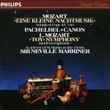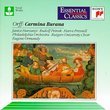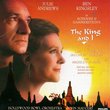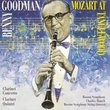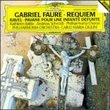| All Artists: Eva Marton, Katia Ricciarelli, Kurt Rydl, Helmut Wildhaber, José Carreras Title: Puccini: Turandot Members Wishing: 1 Total Copies: 0 Label: Sony Release Date: 10/25/1990 Genre: Classical Styles: Opera & Classical Vocal, Historical Periods, Classical (c.1770-1830) Number of Discs: 2 SwapaCD Credits: 2 UPC: 074643916028 |
Search - Eva Marton, Katia Ricciarelli, Kurt Rydl :: Puccini: Turandot
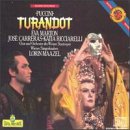 | Eva Marton, Katia Ricciarelli, Kurt Rydl Puccini: Turandot Genre: Classical
|
Larger Image |
CD DetailsSimilarly Requested CDs
|
CD ReviewsA Memorable Performance D. A Wend | Buffalo Grove, IL USA | 10/11/2002 (5 out of 5 stars) "I recalled vividly when this recording was first issued (on LPs) that Eva Marton was hailed as THE Turandot. Her performance is stunning, and her voice was really suited to this difficult role at this phase of her career. Her In questa Reggia has remarkable control I saw her in the role much later when her voice was no longer as sturdy. Katia Ricciarelli, who recorded the role of Turandot herself, does pretty well as Liu but she has trouble with her high notes in Signore, ascolta. By the third act, her voice warms up so she sings her death scene very well. Jose Carreras makes a good Calaf. His Nesum dorma is quite good. He sustains a truly excellent performance for the entire opera. However, it was not long after this performance that he was diagnosed with leukemia, from which he successfully recovered. The supporting cast is very good with some excellent singing. Ping, Pang and Pong are wonderful. The Vienna State Opera Chorus is first rate throughout the Opera. For Lorin Maazel this performance marked his first as music director of the Vienna State Opera, so he was anxious to turn in a glittering occasion, and he succeeded. Turandot can be a visual feast for the eyes as much as an aural treat. This being a live performance some places in the score may be a bit slower, for dramatic effect perhaps, but the overall recording is warm and well balanced. The riddle scene in the second act is very dramatic and the closing scene is very moving.The overall noise is minimal with some stage noise and applause at the start and finish of each act. Liu's aria in the first act got a warm round of applause despite Ricciarelli's thin upper notes. The booklet nicely documents the writing of this opera and Puccini's untimely death. The only unsetting thing about this set is that it is not indexed. If one wants to skip to a particular aria or point in the opera it is exceptionally difficult. This is the only opera that I have that is like this and if Sony ever reissues this Turandot, I hope they will correct the problem. However, if you want to have a dramatically powerful Turandot don't wait." We'll put an end to this Marton controversy forever KDS | 09/19/2007 (4 out of 5 stars) "I own over 10 recordings of this opera. It is my favorite opera of all time. I have listened to it so many times as to have almost all of it memorized. First some history: This production took place in 1983 and was Eva Marton's first performance of Turandot. For you true trivia lovers, an analysis of old opera magazines reveals that Hildegard Behrens(!) of all people, was meant to sing in this production. This officially marked Marton's entrance into the drammatic soprano repetoire. Up until this release, I had heard a number of Turandots-Nilsson, Cigna, Grob-Prandl(still the finest), Dimitrova, and even Turner. A reviewer in Stereo Review magazine extensively compared Marton to Turner. I will tell you this, first, Marton's voice most certainly did deteriorate quickly after beginning to sing the heavier roles. She was however, according to many reviewed performances in various periodicals, mostly magnificent throughout the 80's both vocally and histrionically. Second, this was a role that personally recommended to her by Birgit Nilsson at a performance of "Die Frau Ohne Schatten", at which Marton was singing the kaiserin-yes she sang the empress, and for all those that think Marton never had the high notes, she sang high "E's" in the Le Coq D'or in the early part of here career. The tessitura was certainly not a problem. The very first thing I listened to on this recording was "In Questa Reggia". I compared it side by side with the Nilsson recordings. I don't care what the Nilsson fans say, they are simply political in their rantings on about her talent. Nilsson simply sounds bored and like she's falling asleep compared to Marton in this performance. Marton's high B at "Quel Grido!" simply astounded me at first hearing, and does so to this day. Marton on this night was exultant, totally uninhibited in her approach, and she sang like her voice was invulnerable. She was in superb form, the vibrato was tight, the voice fluid, with some minor breath control problems, but you must remember this was a first attempt. Marton, even in 83, exhibited a peculiarity which unfortuantely would plague her career later on. Her voice was slow to warm up. Just like the much later recording of Elektra, halfway through the voice opens up and really shines. Once we get to the final love duet, the voice is gorgeous, the notes soaring, the passion unending. At the time of release, this recording, specifically because of Marton, was heralded as the introduction of the great white hope of drammatic singing. Because of her vocal decline in the 90's, some have, for whatever reason, changed their opinions of her greatness. All voices deteriorate! Longevity always differs! No one capable of true objectivity in opera singing can deny this performance as one of the greatest of Turandot in the archive. Ricciarelli has some beautiful moments, but alas is at a later stage of her vocal career, as is Carreras. The chorus and orchestra sound wonderful. the recording is NOT reference, but is quite good considering it is a stage recording. You must buy this recording while you can get it if you are true Turandot fan. Highly recommended. " Supreme Sound But Not Sufficient Character From Eva Rudy Avila | Lennox, Ca United States | 11/14/2005 (5 out of 5 stars) "This live recording from the Vienna State Opera was recorded in 1983, and it stars Eva Marton as the regal and icy man-hating Turandot, Jose Carreras as Prince Calaf and Katia Ricciarelli as the tragic slave girl Liu. The sound is phenomenal, with bombastic fortissimi and crisp, thunderous acoustics. The Vienna orchestra often sounds like it has two orchestras playing the same score at a high volume and if the singers do not project above the staff and above the orchestra, they are bound to be drowned by the orchestra itself. There is no denying the mastership of Lorin Maazel's conducting. This is perhaps the most vibrant and dynamic sounding Turandot. But this is not enough to qualify it as an outstanding performance. Turandot, like Puccini's Tosca and Madama Butterfly, should be dramatized and acted just as virtuosically as it should be sung. Turandot may be a figure of Chinese legend, but if you pay close attention to the music, Puccini reduces her to his traditionally human women, easily won over by love. This old legend is about an icy Princess of Peking who has sworn off all men to avenge the death of her ancestor Princes Lou-Ling (it's all there in her aria "In Questa Reggia"). To preserve her virginity and to keep from being married to a man, she baffles suitors with three seemingly unsolvable riddles. However, Prince Calaf arrives with his father (the Tartar King) and his slave girl Liu. He is enamored of Turandot at first sight and is resolved to finally solve the three enigmas and win the hand of the Princess.
As far as portraying their respective characters, Jose Carrerras and Katia Ricciarelli are significantly more convincing than Eva Marton as Turandot. Once again, the individual and combined voices of Carreras and Ricciarelli are stunningly beautiful and emotionally powerful. This is opera's aim- not the intellect but the heart, the emotions. Because Carreras and Ricciarelli were lovers, their voices take on a kind of beauty of its own. In this opera, they are not the lovers but they can still sing as ardently and as expressively as other operatic lovers. Ricciarelli is a fine Liu, in fact the most moving and most striking I've ever heard. She has a light, dulcet voice but is superbly dramatic when warranted. This role fits her like a glove. She is a full-lyric soprano and other fine Lius include Anna Moffo (if she sang the role) Beverly Sills and Cecilia Gazdia who perhaps sings better than Ricciarelli in her own Liu) Ricciarelli would later record Turandot opposite Placido Domingo's Calaf but that recording is heavily flawed because her singing the lead role of Turandot is way out of her league and instead sounds too frail and passive. Carrreras sings Calaf with sensitivity and nobility. Since he is a prince, he must sing with utmost romance and class. Carreras's style of singing works well because he is humble, not overdramatic when compared to Domingo and Pavarotti and therefore all his tenor heroes sound insecure underneath a mask of valor. And this is often a good thing because it gives the tenor hero a bigger dimension of character. Alas, poor Eva! Why did you have to sing this role with no shade in your voice ? It has the same tone throughout the entire opera. She does not portray a dramatic enough Turandot. We get fine loud singing but that's about it. She does not convey a woman who is only lying to herself about being in control and succumbs to love to this mysterious stranger. Her transition from hate to love is too unrealistic in Eva Marton's hands. Maybe it was just a particularly bad night for her. She did a far better job in the 1980's Met performance under the direction of Franco Zefferelli, opposite Placido Domingo and Leona Mitchell. That performance is available on DVD." |

 Track Listings (2) - Disc #1
Track Listings (2) - Disc #1